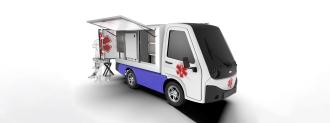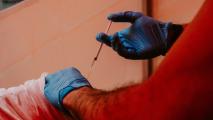When the pandemic began, developing effective COVID-19 vaccines was the top priority. Now that we have several, the focus is on getting them to people.
That’s been challenging for a number of reasons, but a tiny electric truck wants to ease a major pain point in the vaccine delivery process — by bringing shots directly to those who need them.
Distributing COVID-19 Vaccines
Since the U.S. approved its first COVID-19 vaccine in December, about 31 million Americans have been fully vaccinated. That means more than 200 million adults still need at least one shot — and getting it requires jumping through several hoops.
To get a shot, you first need to find out if you qualify (requirements vary from state to state and can change at any time). If you can then find an open appointment slot (a big if), you then have to actually go to the clinic or pharmacy to get your shot.
That last step in the process can put vaccines out of reach for the millions of elderly, low-income, and disabled people without access to reliable transportation — some of the same people who are most susceptible to COVID-19.
“Transportation is often neglected, but it’s often one of the biggest barriers to healthcare,” Caitlin Donovan, a spokesperson for the nonprofit National Patient Advocate Foundation, told Stateline.
Rather than expecting people to go to where the COVID-19 vaccines are, electric vehicle startup AYRO wants to bring the vaccines to them.
AYRO’s Vaccine Delivery Truck
AYRO has teamed up with several other companies to create the Electric Vaccine Vehicle (EVV), an all-electric truck equipped with medical-grade freezer and refrigeration units that meet the CDC’s vaccine storage requirements.
“Throughout the pandemic, we’ve been working with our partners to design customizable EVs for food delivery on college campuses in lieu of crowded dining halls,” AYRO CEO Rod Keller said in a press release.
“We quickly realized that experience designing EVs with hot and cold storage and hygiene precautions translated well to mobile vaccination vehicle design,” he continued.
The vaccine delivery truck can be registered to drive on streets at speeds up to 25 miles per hour, and its battery can support 50 miles of driving, plus six to eight hours of equipment operation.
When the vehicle isn’t on the go, its equipment can be plugged into standard 110 volt outlets.
The EVV produces no emissions and is small enough to be driven into buildings, so a city could choose to set one or more of the mobile clinics up in a gym or warehouse, plug into the available outlets, and administer vaccines all day long.
The vaccine delivery truck could then be set up in a nursing home’s parking lot the next day, or move around from location to location every few hours, delivering vaccines to rural areas or places that aren’t on public transportation routes.
EVV Roadshows
AYRO has yet to announce the cost of the EVV, but it is already working to sell the vehicles.
Over the next few weeks, the company plans to demo the vaccine delivery truck for local officials in several U.S. cities, including Boston, Atlanta, and Los Angeles, at “EVV Roadshows.”
If they like what they see, those cities could choose to add the EVV to their arsenal of weapons against the pandemic.
“(V)accine distribution has become a serious logistical challenge, and our purpose-built EVs offer a potential solution,” Keller said.
We’d love to hear from you! If you have a comment about this article or if you have a tip for a future Freethink story, please email us at [email protected].






